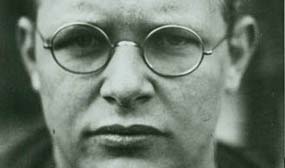 The current Christian landscape in America is a war torn battlefield; daily blogs are launched like scud missiles at perceived ideological adversaries; renowned pastors are revered as decorated generals who are marshaling their congregants for battle; Conservative and Liberal authors, plus those in between and beyond, are ever busy devising top-secret publications designed to finish off the other side for good; all while the innocent lay Christian is caught between the fray, occasionally becoming theological collateral damage.
The current Christian landscape in America is a war torn battlefield; daily blogs are launched like scud missiles at perceived ideological adversaries; renowned pastors are revered as decorated generals who are marshaling their congregants for battle; Conservative and Liberal authors, plus those in between and beyond, are ever busy devising top-secret publications designed to finish off the other side for good; all while the innocent lay Christian is caught between the fray, occasionally becoming theological collateral damage.
But is this slow war of ideological attrition the only way? Is there but a singular option available to us amidst the current culture wars: pick up a weapon and choose up sides? I don’t think so. I am however convinced, as long as the war analogy is kept within reason, that there might be a second and more satisfying alternative: simply playing the host.
You see, during the Second World War in Tegel—one of Berlin’s many suburbs—was a time-worn prison which housed the cell of a condemned conspirator named Dietrich Bonhoeffer from April 5, 1943 through to October 8th of the following year. At this time there were nightly air raids from the Allied Forces and the prison was of course a regular recipient of some of their bombs. From a spectator’s standpoint we might only see a battered prison situated among skeleton-like buildings and rubble laden streets that once was northwestern Berlin.
But amidst what otherwise might be described as Hell-on-earth was a cell where peace, hospitality, and genuine humanness flourished—cell 92. This was Herr Bonhoeffer’s cell. Bonhoeffer was a budding theologian and reconnaissance agent for one of the Hitler-assassination groups whose top-secret documentation (known as the “Zossen” files) was discovered by the Nazis which of course led to his imprisonment and eventual execution.[1]
And though there were many convicted conspirators in many cells throughout Tegel prison Bonhoeffer’s stood out from the rest; rows of books, a humble writing area, mounds of theological writings, personal letters, and a vase filled with flowers which helped to create what one visitor described as a “cozy retreat.”[2] Bonhoeffer is even recorded as saying that he “liked to play the host in his cell.” Fellow prisoners enjoyed and felt comforted during air raids because of their proximity to his cell. Even the hardened Nazi guards were known to visit the cell for prayer and spiritual guidance.
Here, in cell 92, was a place amidst the battle where friends and foes alike could be served coffee or tea, given a morsel of food (rations are especially scarce in wartime), and of course engage in robust theological conversation. It is thus in Bonhoeffer’s unlikely “cozy retreat” of a cell that I discovered our alternative of “playing the host.”
What I’m attempting to convey is there needs to be more cell 92’s amidst our war-torn Christian culture; places of solace where Bonhoeffer-like hospitality flourishes; where friend and foe alike can discover momentary reprieve, and all this while we ourselves do the hosting. Surely our homes, apartments, church buildings, and even prisons can be radically transformed to accommodate those around us; after all, there was nothing special about the cell itself, as much as it was about the type of person who occupied it.
Nevertheless, what Bonhoeffer did was not entirely without its precedent; you see, cell 92 was really a reenactment of what occurred nineteen-hundred years earlier in the Upper Room where Christ himself on the eve of his own execution managed to transform a sullen final meal into a joyous feast by himself playing the Host. And is it not the Host, the One who sets out bread and wine for his friends and enemies, that we are to follow and emulate? Indeed!—thus, let the Christ-like Bonhoeffers arise and begin setting out their tables wherever indeed that may be. I close with one of Bonhoeffer’s daily meditations written from his cell in Tegel:
In the midst of discipline, the entire fullness of the Holy Spirit wants to unfold and to ripen, and we should give it full space within us for the sake of God, for the sake of others, and for our own sake. The entire world of God, the dear Father, wants to be born in us, to grow and ripen. Love—where only suspicion and hostility reign; joy—instead of bitterness and pain; peace—amid internal and external strife; patience—where impatience threatens to overwhelm us; kindness—where only raw and hard words seem to make any difference; goodness—where understanding and empathy seem like weakness; faithfulness—where long separations and enormous changes in all relationships seek to rock the foundations of even what is most stable; gentleness—where recklessness and selfishness seem to be the only ways to reach one’s goals; self-control—where short term pleasures seem to be the only reasonable option and all bonds are about to dissolve.[3]
[1] Sabine Dramm, Dietrich Bonhoeffer and the Resistance (Fortress Press: Minneapolis, MN, 2009).
[2] Eberhard Bethge, Dietrich Bonhoeffer A Biography (Fortress Press: Minneapolis, MN, 2000), pg 852.
[3] Mark S. Brocker ed., Dietrich Bonhoeffer: Conspiracy and Imprisonment 1940-1945, in Dietrich Bonhoeffer Works Vol. 10 (Fortress Press: Minneapolis, MN, 2006), pg. 628.
—————————————————————————
Lawrence is the Senior Teaching-Pastor of Academia Church in Goodyear, Arizona. He is a pastor devoted to the educational growth of his congregants, and the raising up of a new generation of disciples, who will think, tell, and live out the Christian story. Lawrence is currently attending Liberty University.











